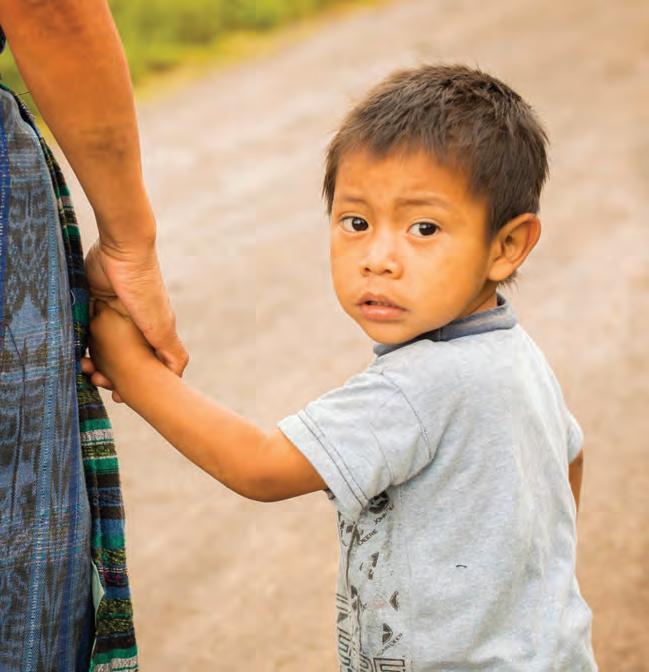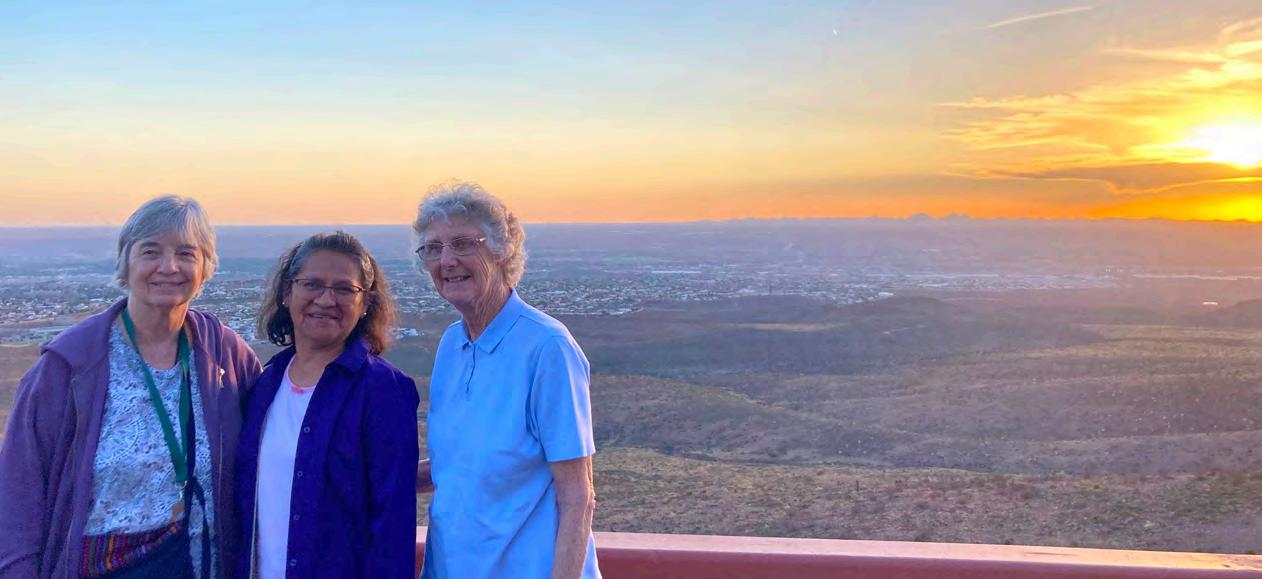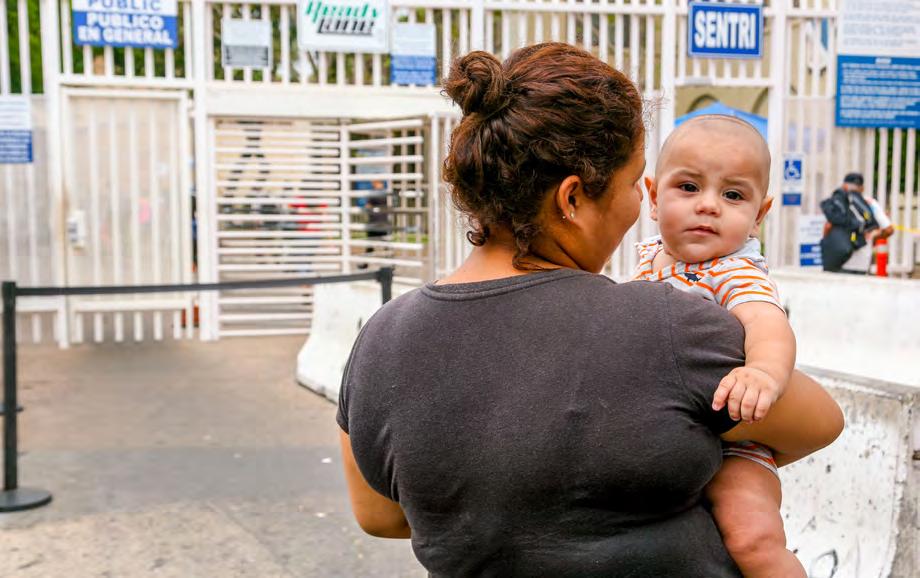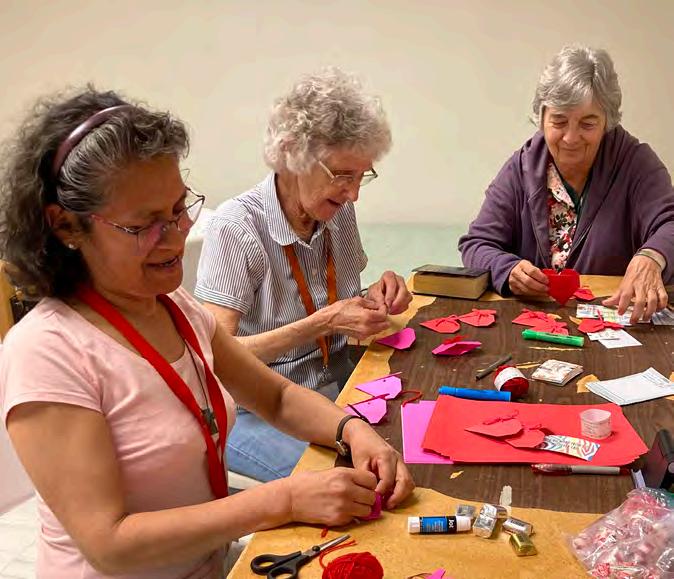
7 minute read
Reaching Across Boundaries: From the Leadership Circle
from DOME Summer 2021
by ursulineslou
Reaching Across Boundaries
When was the first time you learned a lesson, deep in your heart and soul, about reaching across the boundaries of race and culture? When I was a novice, Sister Clara Fehringer (novice director), encouraged my involvement with the Tran family, refugees from Vietnam living in a house on the Ursuline campus. For that year, I became a homework tutor for the teenage daughter, Hen (pronounced Han). The large Tran family brought to mind my large family, especially the joking rapport of teenage brothers and sisters. I realized that I could appreciate and respect the differences, like culture, language and food, but also see what tied us together in the larger human family.
Advertisement
In Christ there is no east or west, in him no south or north, but one great fellowship of love throughout the whole wide earth. –John Oxenham
This hymn came to my mind as I reflected on this issue of the DOME. You will see in these pages the themes of inclusion and reaching across boundaries. There is the story of the ministry at the U.S./Mexico border at Annunciation House in El Paso. This is not only about the way Sisters Yuli Oncihuay, Kathy Neely and Carol Reamer gave hospitality and respect to the guests seeking asylum and a better life, it is also about how they received graces and insights during their month of service.
Long before the recent call for respect toward our brothers and sisters who are Asian-Americans and Pacific islanders, the Ursuline Sisters stretched beyond the usual racial and ethnic boundary lines. On these pages, you will see how the Ursuline Sisters of Louisville accompanied Chinese students at Ursuline College and years later sponsored the Tran family upon their arrival here as refugees from Vietnam. As in the Angela Merici Center reflection in this issue, we are constantly called to widen the circle when we consider Jesus’ questions: Who is my neighbor? What does the Gospel call us to do for and with our brothers and sisters?
Finally, to highlight one other piece in this DOME, the Peruvian Journal beautifully describes how the people of the Santa Angela Merici school, parish and their wider circle of friends practiced solidarity with
Javier and Miguel, sons of Dominga Sernaque. They show us how to be neighbor to the people who need our neighborly concern and our action.
Remember this as you consider how you can practice welcome and inclusion, how you can act in solidarity with people who are different or who live on the other side of an old boundary line:
In Christ there is no east or west, in him no south or north, but one great fellowship of love throughout the whole wide earth. –John Oxenham
Sister Agnes Coveney, OSU Councilor, Ursuline Sisters of Louisville

WITNESS AND MINISTRY AT THE BORDER Accompanying Those At The Border
BY KATHY WILLIAMS
Peanut butter sandwiches, one set of clothes and a pair of shoes.
This is what the guests of the Casa del Refugiado of Annunciation House, a temporary shelter in El Paso, Texas, are given when they leave this brief sanctuary and continue on their way to cities across the country to families and friends who will sponsor them.
The guests, as they are called at the shelter, otherwise known as migrants, asylum seekers or refugees, come from many countries: El Salvador, Nicaragua, Ecuador, Mexico, Haiti and Jamaica, to name a few. Most are fleeing their homes due to economic hardship, domestic violence or, for many, the gangs in their country. Gangs, usually run by drug cartels, will kill young men if they don’t join their gang, or kill their family members in retaliation.
Many of them end up being deported back to their home country to face the extreme poverty, violence or other situation they were fleeing. The fortunate ones make it to a border shelter, such as Casa del Refugiado (the House of the Refugee). They arrive by bus from U.S. Immigration and Customs Enforcement, usually wearing a uniform of light grey pants, a dark blue shirt, flip flops and sometimes an ankle bracelet for monitoring their movements.
Over a hundred refugees arrive at Casa del Refugiado daily. Staff and volunteers register them, feed them and give them lodging for the short time that they are their guests, usually 1-3 days. The volunteers also contact their families who will provide a bus or plane ticket that allows them to get to a more permanent destination.
This past spring, the Leadership Conference of Women Religious sent out a call for Catholic Sisters to volunteer at the border. So, in May, three Ursuline Sisters set out for El Paso to serve for one month at Casa del Refugiado: Louisville Ursulines Yuli Oncihuay and Kathy Neely, and Toledo Ursuline Carol Reamer. The three had lived and worked together for decades in Peru, and having felt so supported by the Peruvian people in their ministry there, they wanted to “offer that same welcome and support to our brothers and sisters coming to our borders here in the United States,” according to Sister Yuli.
Sister Kathy said that everyone had a story, and no two stories were the same. Sister Carol said that there were a lot of children, often with just their mother, as the men are often detained at the border. The mothers, many of whom are pregnant when they arrive at the shelter, make the agonizing decision to continue on without their husbands. Mealtimes are meant to be family time at the shelter, but often, Sister Yuli said, you would see the children crying, then saying over and over, “Daddy, we miss Daddy.”
Sister Yuli told the story of one very young child who was terrified to come into the “clothes closet,” where the families are allowed to pick out one set of clothes. He was fearful and would cling to his mother, sobbing. In talking with the mother, Sister Yuli discovered that this mother and child had spent three



days in a refrigeration truck to get to the border. The child was traumatized, as were many others, Sister Yuli noted. She worries that the children will not receive the therapy that they need to overcome all of the trauma they have gone through.
Sister Yuli, a native Peruvian, was “a presence to the families. Her heart is bigger than she is,” said Sister Kathy. Sister Yuli wanted to just gather all the children up and protect them, she recalled. Sister Yuli said, “It’s like the story of The Little Prince—little by little, you cultivate your friendship with them, just like the Prince did with his rose.”
Growing up in Tiffin, Ohio, Sister Carol developed her love for immigrants and helping them in the sixth grade! Her religion teacher asked her to come visit with migrant farm workers in the farm fields that summer. When asked why she continues to work with refugees, Sister Carol replies simply, “Because I can’t not do it. It’s been in my blood since I was young.”
Sisters Kathy and Yuli tell of a Mass held at Pentecost at the shelter. When Mass had ended, Sister Yuli, in true Peruvian fashion, began dancing and singing songs with everyone. For one of the songs, Letra A que tú sabes (Oh, You Don’t Know), Sister Yuli changed a word in each verse to include all the countries represented by the people present:
Oh, you don’t know, what happened in Damascus, what happened.
It was the Holy Spirit, Oh!
Oh, you don’t know, what happened in my life, what happened. It was the Holy Spirit, Oh! Who poured Himself into me. Oh, you don’t know, what happened in Guatemala, It was the Holy Spirit, Oh! Who poured Himself into me. Oh, you don’t know, what happened in Nigaragua …El Salvador …Haiti …Brazil …Mexico …Ecuador …Venezuela …Costa Rica It was the Holy Spirit, Oh!
We “don’t know what happened” in any of these countries, exactly, to cause the crisis at the border, according to Sister Kathy, who states, “We need to work to understand the causes and work on the roots of these causes.”
Sister Kathy continued, “It is a human situation. I see humanity as a global community. We have room in our country to share with our global sisters and brothers. Their presence and their different cultures enrich us as a nation. The refugee families are coming to our borders because of the present difficult situations in their countries. Why did Mary and Joseph flee to Egypt? They were simply trying to save their child, Jesus, like these parents are simply trying to save their children.”








